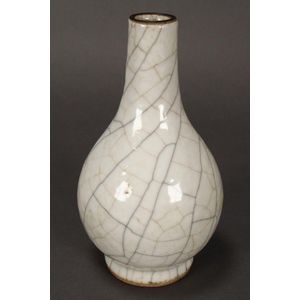Crackled Ge Ware Vase with Wax Seal Mark
You must be a subscriber, and be logged in to view price and dealer details.
Subscribe Now to view actual auction price for this item
When you subscribe, you have the option of setting the currency in which to display prices to $Au, $US, $NZ or Stg.
- Crackles / Cracquelure - In ceramics, crackles may be introduced intentionally during the firing process, as was often the case with Oriental ceramics, and are known as artificial crackles. Natural crackles occur with age, and if the glaze is transparent, may be difficult to detect. Natural crackles may not cover the whole surface of the object and may be uneven in size.
- Crackling and Crackle as a Decorative Technique - Crackle, also known as crackling, is a decorative technique that has been used in China for centuries. It is believed to have originated during the Song Dynasty (960?1279 AD) and was primarily used in the production of ceramics, lacquerware, and furniture. The crackling effect was achieved by applying a glaze or lacquer that was formulated to crack during firing, creating a crackled pattern on the surface of the item.
During the Ming Dynasty (1368?1644 AD), crackle became a highly sought-after decorative technique, and it was used to create intricate and beautiful designs on ceramics and lacquer ware.
In Western decorative arts, crackle / crackling came into use during the Art Nouveau movement in the late 19th and early 20th century. The crackling effect was used to create a sense of movement and fluidity in the design of Art Nouveau pieces.
It was also used in the 1920s and 1930s during the Art Deco movement.
This item has been included into following indexes:
Visually similar items

A William Moorcroft 'Freesia' salt glaze vase circa 1930 of baluster form the body decorated with freesia. Height 23 cm. Signed to base

A Chinese crackleware bottle vase, with a black and tan crackle upon an oatmeal coloured ground. Height 16.5 cm

A Chinese vase with irridescent glaze and gilt highlights decorated with dragons, clouds and lotus flowers. Marks to base. Height 42 cm

Belleek vase with shamrock decoration, blue mark
